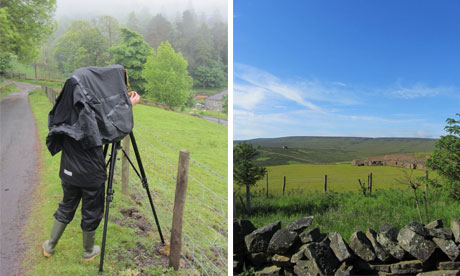
Human society's maelstrom of interrelations has thrown up many unlikely ways of making a living: personal shopper, search engine optimisation consultant, deputy prime minister, the list goes on. But, for sheer desirability, there's one job title that trumps them all: artist-in-residence.
Regrettably, it's a position open to a shockingly small percentage of the population. That's about to change, however, since the good folk at Allenheads Contemporary Arts (ACA) in Northumberland are giving ordinary people who may not even have made the Turner Prize longlist the opportunity to sample the glorious artist-in-residence experience.
And what a fine locale Allenheads is. Hopping off the bus in what is England's highest village (a claim hotly disputed by nearby Nenthead – a thorny topic best avoided by outsiders, frankly) I found myself in the midst of a community with a pleasing world's-end feel to it. There's a pub, a cafe, a small heritage centre and no shop. The scattering of stone-built Victorian houses, constructed for workers at the now defunct local lead mines, is clearly waiting for the inevitable day when nature reclaims the neighbourhood for its own. I climbed the steep ascent to the former schoolhouse that serves as ACA's HQ and breathed in the scenery.
Although they ask that their artists-in-residence open themselves up to all that this remote nook of the north Pennines offers (including the friendly pub-life), the couple who run ACA are very relaxed about what they expect of their guests. "You don't even have to create a piece of art," Helen, the curator, assures me when I arrive. "If you just want to come here and think and have some space, that's fine too."
But I am their very first artist-in-residence and I feel I should make some sort of effort. After all, there are no boundaries here: I could paint, sculpt, make an installation or performance piece, draw (actually, scrub that – I draw as if I have no opposable thumbs), whatever, but my heart is already set on the creation of a short film. Alan Smith (alansmith.org.uk), the other half of ACA, happens to be an internationally exhibited video artist, which comes in handy later on when I have a post-production panic.
Once I'm settled into my cosy but minimalist bedroom in the section of the schoolhouse converted to accommodate visiting artists (including a brand new communal kitchen), Alan offers me a beautiful gallery space to use as my studio. Originally an inn, then a coaching house, then a bus garage, the gallery is in the centre of the village and I soon find myself holding court to visitors who pop in to ask me what I'm up to.
What I'm up to, of course, is Great Art. This is just as well because in five days' time my film will have its international premiere: a public screening in the gallery. I duly spend my first day on a very pleasant ramble-cum-recce seeking inspiration from the village and surrounding fells. On day two I bang out the script – a rewriting of the history of Allenheads via the deliberate misinterpretation of local landmarks. By day three, I'm out and about with a video camera battling a succession of heavy showers. Handily, my script brimmeth over with pathos so I can use the rain for pathetic fallacy.
Come day four – or The Day Before Screening Day, as I've rather nervously started to call it – a group of Newcastle Uni art graduates, including, mysteriously, a young woman called Bob, drop into ACA to plan some projects. I take the opportunity to hobnob with these real artists and they cook me a fine dinner.
My final day is something of a blur. Alan set me up with a professional film-editing suite and I went about recording all the narration and painstakingly cutting my film to it. Then I discovered that I hated the way I'd narrated it and did it all again, thus forcing a complete last-minute re-edit. This is called suffering for one's art.
I was just lacking a soundtrack. I'd ambitiously brought along a glockenspiel to record my own solo free-jazz exploration. Mercifully time-pressed however, I opted for a tune from a CD given me by my friends at The Cabinet of Living Cinema (thecabinetoflivingcinema.org.uk), a band that performs scores for proper short films. And now for mine too.
With the hour of reckoning fast approaching and Alan deftly helping me add the final credits, Helen transformed the gallery into a screening theatre. That evening we had competition from nearby Allendale whose cinema club were putting on Witness. Much to my amazement, however, our dozen or so chairs were soon filled with actual living breathing punters. Take that, Harrison.
I'm sweaty-palmed as I rise to give my inspirational pre-screening speech. "I've, err, filmed the sights of Allenheads and put together a fictional tale that makes sense of them even though, of course, almost nothing in the story ever, er, happened." I finish with a mumbled desire that my film will encourage people to find new ways of seeing familiar things. Or something.
The lights go down, the projector rolls (all right, the computer whirrs), and the titles come up: The Life and Peculiar Times of Allen Heads.
When it's all over, and the kind applause dies down, Alan asks if he can add my work to his Allenheads film archive. Have I ever ended a holiday quite so chuffed? You know, I don't think I have.
• The artist-in-residence break was provided by Allenheads Contemporary Arts (01434 685040, acart.org.uk). It costs from £161pp per week (£840 to book entire venue, maximum 10 people) including self-catering accommodation, studio space and artistic support. Train tickets were supplied by East Coast (08457 225225, eastcoast.co.uk), singles from London to Newcastle from £12; and Northern Rail (08450 000125, northernrail.org), singles from Newcastle to Hexham from £2

